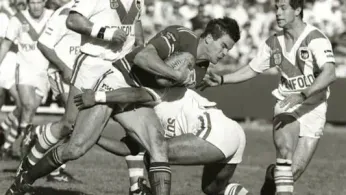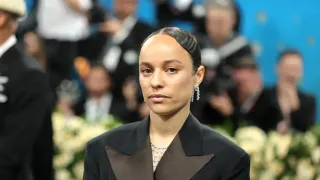
4 hours ago
‘Being Gay Is My Superpower’: Rugby Legend Ian Roberts Celebrates His Trailblazing Legacy
READ TIME: 3 MIN.
When Ian Roberts publicly came out as gay in 1995, he did more than make sports history—he ignited a conversation about courage, visibility, and the power of authenticity in an arena often resistant to change . Nearly thirty years later, Roberts continues to shape that conversation, now describing his sexuality as his “superpower”—a declaration that underscores not only personal resilience but also the transformative potential of LGBTQ+ representation in sports.
In recent interviews coinciding with the launch of a documentary project chronicling his life and advocacy, Roberts shared, “Being gay is my superpower. It’s the thing that has given me perspective, empathy, and a drive to make sure nobody else has to feel alone in their struggle” .
Born in Chelsea, London, in 1965, Roberts emigrated to Australia as a child, quickly establishing himself as a formidable force in rugby league . His career spanned several top-tier teams, including the South Sydney Rabbitohs and Manly-Warringah Sea Eagles, and he represented New South Wales and Australia at the highest levels, including the State of Origin series and the Rugby League World Cup .
Roberts’ reputation for toughness on the field was matched by his resolve off it. His 1995 announcement made him the first high-profile Australian athlete—and the first rugby footballer in the world—to come out as gay, in an era when homophobia remained widespread in sports and society . The move, while risky, was met with both challenges and support, as teammates, fans, and media grappled with evolving attitudes toward LGBTQ+ participation in sport .
Roberts’ coming out was not without consequence. While he received support from some quarters, he also faced homophobia and isolation both within and outside the rugby community . Despite these challenges, Roberts remained steadfast. “There were moments of fear and uncertainty, but I knew that living authentically was more important than any trophy,” Roberts reflected in a recent interview .
His visibility paved the way for future LGBTQ+ athletes, challenging stereotypes and opening the door for conversations about sexuality, mental health, and inclusiveness in professional sports . According to the Lesbian and Gay Anti-Violence Project, Roberts’ courage helped to debunk long-standing myths about LGBTQ+ participation in sports and inspired campaigns against homophobia featuring prominent rugby league figures .
Since retiring from professional rugby league, Roberts has pursued a career in acting and media, appearing in television, film, and as a commentator for the NRL . More importantly, he has become a prominent advocate for LGBTQ+ rights, lending his voice to campaigns and initiatives aimed at combating discrimination and promoting acceptance .
Roberts’ autobiography, *Finding Out*, and his public testimony—including his candid discussion of surviving sexual abuse—have further cemented his role as a leading figure in both sport and LGBTQ+ communities . In 2013, he was inducted into the Australian Rugby League Hall of Fame, an honor that recognized not only his athletic prowess but also his groundbreaking advocacy .
Roberts is now the subject of a new documentary project, "Light", which aims to chronicle his journey as an athlete and activist . The film, currently seeking support through a crowdfunding campaign, is expected to feature interviews with peers, family, and members of the LGBTQ+ community who credit Roberts with changing the landscape for LGBTQ+ athletes.
Discussing the upcoming documentary, Roberts noted, “It’s not just about my story. It’s about how being visible, being proud, and being yourself can change minds and save lives. That’s the real legacy I want to leave” .
Roberts’ influence is still felt today. While professional sports remain a challenging environment for many LGBTQ+ individuals, the landscape has shifted markedly since 1995. Athletes such as Roberts have demonstrated that visibility and authenticity can break down barriers and foster greater acceptance . LGBTQ+ advocacy groups, sports organizations, and media outlets now regularly highlight stories of inclusion and challenge lingering stereotypes.
Still, Roberts acknowledges that the work is ongoing: “There’s still a long way to go, but every athlete who shares their story makes it a little easier for the next. That’s the real power of being out.” .
As LGBTQ+ History Month is celebrated around the world, Roberts’ journey serves as a powerful reminder of how far the movement has come—and how much further it can go. His willingness to embrace his identity, leverage it for positive change, and speak candidly about the challenges and rewards of being an openly gay athlete have made him a role model not only for LGBTQ+ people, but for anyone striving to live authentically.
Roberts’ ongoing advocacy, his embrace of his “superpower,” and the public’s continued interest in his story underscore the enduring importance of representation, acceptance, and pride—in sport, and in life .






